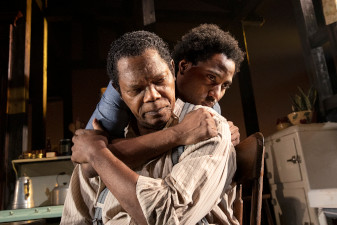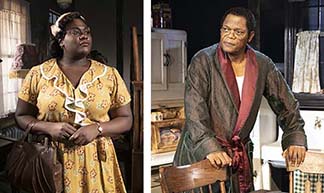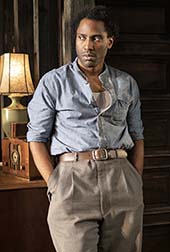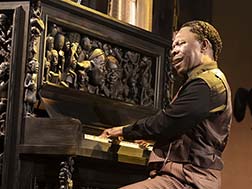
Two Views of "The Piano Lesson"
Paulanne Simmons
Lucy Komisar
"The Piano Lesson"
"The Piano Lesson" is the fourth play in August Wilson’s The Pittsburgh Cycle (ten plays, nine of which take place in Pittsburgh’s African American Hill District). Set in 1936, during the Great Depression, the play focuses on the Charles family: the volatile Boy Willie, his sister, the practical and deeply rooted Berniece, their uncle, the stolid Doaker, and Doaker’s easygoing elder brother, the musician and gambler Winning Boy. Wilson claimed he originally intended to write a play with a strong, female character, and Berniece, who refuses to let Boy Willie sell the family heirloom, a piano carved with the images of their slave ancestors, certainly fits the bill. But Wilson acknowledged he ended up with a play that questions whether tradition can coexist with progress. That was fine with audiences and critics. The play won the playwright a Pulitzer Prize and remains a classic in the repertoire of American drama. But despite Wilson’s brilliant writing, "The Piano Lesson", which clocks in at about three hours, is a strain on the attention of the audience and the stamina of the actors. Only a very strong cast can prevent the play from getting bogged down during scenes with lengthy dialogue. Fortunately, director Latanya Richardson Jackson has assembled a cast for this season’s revival at the Ethel Barrymore Theatre that more than meets the demands of the drama. High praise has been heaped deservedly on John David Washington, who plays Boy Willie, But when Washington is not declaiming, it is the more subtle performances that hold the play together. Ray Fisher, who plays Boy Willie’s friend, the not too bright Lymon, is a gullible and naïve contrast to his more worldly and bitter friend. The scene in which he almost successfully woos Berniece comes close to stealing the show. Trai Byers creates his own fireworks as the preacher steeped in the language of the Bible. If there’s anyone who can exorcise the ghosts that haunt the Charles’ home, it might just be Avery. Danielle Brooks, as Berniece, effectively explores the many dimensions of this strong black woman’s character: single mother, sister, and defender of family tradition. Berniece may not play the piano, but she is not going to let Boy Willie take it from its place of honor in the Charles home and sell it off as he is selling his watermelons. Michael Potts as the amiable Winning Boy, is the source of gentle humor. The scene in which he sells Lymon a suit and a pair of shoes that don’t fit him is a comic masterpiece. And April Matthis makes a big impression in her not so big role as Grace, the party girl who keeps popping in at the wrong time. Unfortunately, Samuel L. Jackson is somewhat underused as Doaker, who for much of the play merely looks on. But when it’s Doaker’s turn to narrate the story of the piano, we understand why the role needs an actor with Jackson’s chops. There’s one more character in "The Piano Lesson". And that’s the silent house in which the Charles family and the piano reside. Scenic designer Beowulf Borritt has given us the spectral, skeletal beams of the house, which might easily find its place on the set of Beetlejuice or The Addams Family. It is a visual representation of the disintegration that threatens the Charles family and the ghosts that haunt them. "The Piano Lesson" was written twenty-five years ago. But, as this production proves, the questions it asks about family relationships, our past and our future endure and prevail.
“The Piano Lesson” teaches honoring memory of those who fought slavery “The Piano Lesson” August Wilson’s “The Piano Lesson” is not about learning how to play the piano. It is about the powerful lesson an old ornately carved piano teaches about history and about the respect and honor one owes one’s forbears, especially when they suffered greatly to preserve the dignity they bequeathed to their children. It’s about slavery.
This is one of ten plays Wilson wrote over years, each highlighting a different decade in the lives of black people living in Pittsburgh. In this case, it’s 1936. Berniece (Danielle Brooks) lives with her uncle Doaker (Samuel L. Jackson) in his two-story A-frame house which he bought with pay from 27 years working for the railroad. Her husband died three years earlier, and she cleans people’ houses to support herself and her daughter. Brooks is strong and tough as the quintessential single mother defending herself and her child.
Her brother Boy Willie (John David Washington) arrives unexpectedly from Mississippi one middle-of-the-night with his friend Lymon (Ray Fisher), driving a truck full of watermelons they plan to sell. The undercurrent is Willie’s desire to sell the piano left to him and Berniece by their father so he can use the money to buy farmland in Mississippi and grow cotton and crops. Washington is brilliant as Willie, tough, rough, a voice filled with fury, anger, resentment, a man on fire. (Jackson played Boy Willie when the play opened in 1987.) The land will be sold by a man named Sutter, whose father was killed when he fell into a well. People says he was pushed by the ghost of yellow dog. That goes to another story. In the 19th century, a Robert Sutter was selling slaves. A local white bought a woman and her 9-year-old son in exchange for a piano. In a convoluted part of the story, they are bought back and they carve the family history on the piano. Much latter Willie’s father steals the piano. He is imprisoned, escapes, and the yellow box car he is riding in is set afire. As if it were a curse, the ghost of yellow dog takes revenge and people die falling into wells. Now Boy Willie wants to sell the piano to help pay for Sutter’s land. Berniece considers that an outrage. She is still angry that Willie got her husband Crawley to help move some wood that turned out not to be his and led to Crawley being shot and killed by the sheriff.
The other characters who fill out the plot are Lymon (Ray Fisher), slow speaking, not too bright, and Avery (understudy Charles Browning the night I saw it), a preacher who in a day job runs an elevator in an office building and recounts a dream of three hobos who chose him to preach the word of God. There’s an interesting moment where Berniece rejects Avery’s proposal: “You’re trying to tell me I can’t be nothing without a man.” Both Fisher and Browning are fine as their types. Wining Boy (Michael Potts), Doaker’s brother, is a down-on-his-luck gambler and piano player whose best memories are of the lady he was not smart enough to keep. Potts is a very fine boogie pianist and singer. He does terrific stomping songs from the infamous Mississippi Parchman prison. Director LaTanya Richardson Jackson, who is married to Samuel L Jackson, keeps the energy level and emotions high. The story is full of violence, mostly perpetrated by and occasionally visited on whites. You feel on edge. But then you realize this is about more than specific acts of violence but about the trauma of the generations, from slavery to abuse of free blacks to the anger threatening a family. Visit Lucy’s website http://thekomisarscoop.com/ |
| recordings | coupons | publications | classified |




